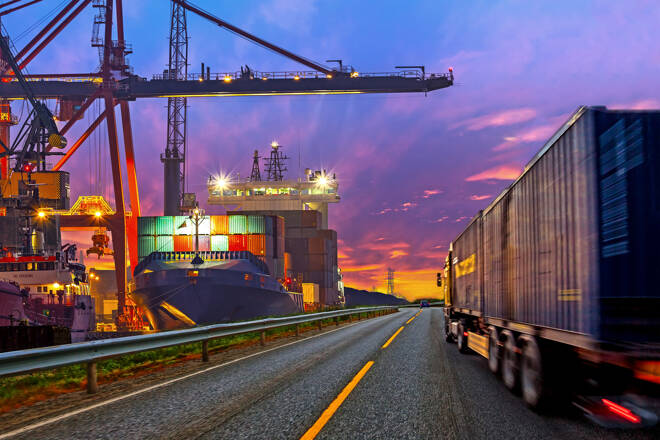Advertisement
Advertisement
CO2 Market The New Gold For Ceres Shipping?
Published: May 6, 2022, 09:36 GMT+00:00
British Greek Ceres to enter CO2 maritime transportation sector in full
Key Insights
- Ceres to acquire 60 CO2 vessels.
- CCUS market to hit $55 billion by 2030.
- 10 Gigatons CO2 capture by 2070, 7.6 Giga by 2050.
Opportunities in the energy market are not only natural gas or LNG projects, but also the need for increased CO2 capturing and storage in future. To grab part of the market developments, British listed Greek shipping company Ceres Shipping, owned by Panagiotis Livanos, is entering full force into the CO2 shipping sector.
CERES targeting 50 million tons CO2 2035
Ceres announced that it has signed an agreement to acquire 60 CO2 transport vessels in a move to transport around 50 million tons of CO2 by 2035. The company also has stated that it will be investing in the necessary terminals to support all. The company is expecting to be able to transport around 5 million tons of CO2 by 2025.
Ceres has set up a new company, called ECOLOG, which will be the operator of the 60 vessels and terminals. According to Livanos, the market will need additional maritime transport options to tackle the demand the coming years. Livanos stated they will be investing into all aspects of Carbon Capture Utilization and Storage (CCUS), as needed to comply to the net-zero targets set for 2050. At present technical developments are up-to-date to reap the rewards available. CO2 transportation is in line with liquified natural gas technology and carriers requirements.
Carbon capture and storage in geological formations (CCS) consists of capturing CO2 from industrial facilities, ships and transporting. After that it will be stored underground into suitable underground geological formations. The plans of ECOLOG are now to set up a maritime network to connect CO2 emitter to storage facilities at lower costs.
ECOLOG is mainly supported by Ceres Shipping, who is already investing in both LNG via GasLog and bulk dry cargo transportation via DryLog. As stated by ECOLOG it will have the first of their kind in with a minimum of 20,000 cubic meters (local transport) to 85,000 cubic meters (longer distance). The company expects that each of its vessels to be transporting over 1 million tons of CO2 per year.
New market entries targeting CO2 maritime transportation Europe
Ceres is not the only one currently looking at the CO2 maritime transportation market. The last days EverLoNG stated that it will be conducting technology trials on board two LNG-fuelled ships. A cross-boundary project involving science and industry experts has landed €3.4 million (total budget €4.9M) from an EU climate action fund to accelerate the uptake of ship-based carbon capture (SBCC) by international shipping companies. The ships are being owned and operated by French oil and gas giant TotalEnergies and Heerema Marine Contractors. At the same time, the trials, which are backed by 16 European partners, is targeting the development of full-chain carbon capture, utilization and storage (CCUS) networks.
Technology companies are also targeting CO2 maritime transport options. Danish pumping company reported this week that it has been awarded a contract to supply pump systems for two CO2 carriers that will transport liquid CO2 to the Northern Lights storage facilities in Norway. Northern Lights currently is setting up infrastructure to transport CO2 in Norway and other European countries by ship. The latter project is going to start operations in 2024.
The two CO2 carriers are going to be built by Chinese shipyard Dalian Shipbuilding (DSIC), with a capacity of 7,500 m3 of liquid CO2. French shipping company Sogestran Shipping, in cooperation with industrial gas supplier Air Liquide, going to set up large-scale liquid CO2 shipping and barging solutions tailored to the needs of future carbon capture and storage (CCS) projects in Europe. Both parties are targeting new ship-designs and barges.
10 Gigatons CO2 capture requirements 2070
CO2 shipping will be needed, especially as long as CO2 transportation pipeline infrastructure is not readily available. At present, reports even are stating that by 2070 10 gigatons per annum (Gtpa) of CO2 needs to be captured, while large industrial installations in Europe are reported to be emitting around 1.3 Gtpa. Seaborne trade is emitting 11 Gtpa. The latter is a major support to a new CO2 shipping segment in the making.
CCUS market to hit $55 billion by 2030
Scandinavian consultancy Rystad Energy stated this week that total CCUS projects could reach $55 billion annually by 2030. The latter is based on anticipated project cost of $75-$100 per ton of CO2 captured. At present, global projects pipeline is around 200 CCUS projects, with a target of pulling out more than 550 million tons of CO2per year by 2030. Europe’s capacity is expected to hit 222 million tpa by 2030, in comparison to 7 million tpa of CO2 captured at present. At present, CO2 goals set globally for Net-Zero 2050 is around 7.6 gigatons of CO2.
About the Author
Cyril Widdershovenauthor
Dr. Widdershoven is a veteran Energy market expert and holds several advisory positions at various international think-tanks and global Energy firms.
Advertisement
